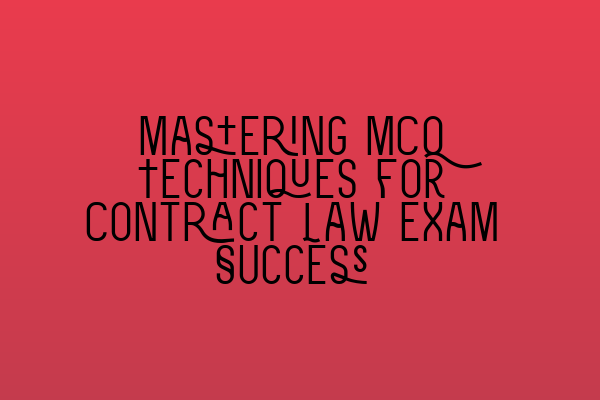Mastering MCQ Techniques for Contract Law Exam Success
Preparing for a contract law exam can be a daunting task. With the volume of information to cover and the pressure to perform well, it’s crucial to have effective strategies in place. One such strategy is to master multiple-choice question (MCQ) techniques. MCQs are a common format in contract law exams, and by mastering these techniques, you can increase your chances of success. In this article, we will explore some valuable tips and techniques to help you ace your contract law exam.
1. Read the Question Carefully
One of the common mistakes students make is rushing through the questions without fully understanding them. Take your time to read the question carefully and identify the key elements. Pay attention to the facts provided and any nuances or exceptions that may be present. This careful reading will enable you to spot any tricks or traps set in the question.
2. Analyze the Options
Once you have a clear understanding of the question, analyze the options provided. Start by eliminating any clearly incorrect answers. Often, there will be one or two options that can be easily eliminated, giving you a higher chance of selecting the correct answer. Then, carefully consider the remaining options and compare them against the facts and legal principles you have studied.
3. Look for Keywords and Phrases
Keywords and phrases can provide important clues in MCQs. Scan the question and options for any relevant keywords that might signal a particular legal concept or principle. These keywords can guide your thinking and help you select the most appropriate answer. For example, if the question mentions “offer” and “acceptance,” it may be testing your knowledge of contract formation.
4. Use Process of Elimination
If you are unsure about an answer, use the process of elimination. Start by eliminating any options that are clearly incorrect. Sometimes, even if you are unsure of the correct answer, you can still eliminate one or two options based on your understanding of the subject matter. This increases your chances of selecting the correct answer by narrowing down the options.
5. Consider the Context
Consider the overall context of the question and the legal principles involved. Sometimes, the answer may be influenced by specific facts or circumstances mentioned in the question. Look for any contextual clues that can help you determine the correct answer. Remember to apply the relevant legal principles rather than relying solely on common sense or personal opinion.
6. Practice, Practice, Practice
Mastering MCQ techniques requires practice. Take advantage of past exam papers, sample questions, and online quizzes to build your skills. Practice under timed conditions to simulate exam pressure and enhance your ability to answer questions within the allocated time. Regular practice will not only improve your understanding of the subject matter but also familiarize you with the format and types of questions typically asked in contract law exams.
7. Seek Feedback and Review
Seeking feedback on your practice attempts is crucial for improvement. Ask your professors, tutors, or study partners to review your answers and provide constructive criticism. Review any incorrect answers and understand why you went wrong. This reflection will help you identify areas of weakness and allow you to focus your study efforts accordingly.
By mastering these MCQ techniques, you can approach your contract law exam with confidence and significantly improve your chances of success. Remember to stay calm and focused during the exam, manage your time wisely, and trust in your preparation.
For more information on different areas of law, check out our related articles:
- Barrister vs. Solicitor: A Comprehensive Comparison
- Embracing the Rise of Virtual Law Practices
- Unveiling Real-Life Case Studies: Insights into Legal Practice and Decision-Making
- Exploring Solicitor Salaries in the UK: Average Earnings and Factors Affecting Income
- Mastering Client Relationship Management: Skills for Solicitors to Enhance Trust and Loyalty
